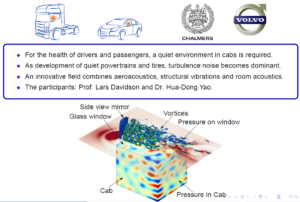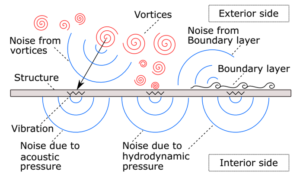Project title: Prediction of External Flow Acoustic Impact on In-cab Noise
Project period: 2014-12-01 — 2018-12-31
Funding body: Fordonsstrategisk forskning och innovation (FFI) of VINNOVA
Grant number: 2014-01386


Introduction to project contents:
A quiet cabin environment is a common concern of automotive and aeronautic industries to manufacture high-class productions in consideration of comfort. Besides, long-term exposure to a noisy environment might render health problems, e.g., psychological disorder and hearing loss. Turbulent flows are known as an important contributor to interior noise in truck cabins at cruising speeds between 80 and 90 kph. Besides, the flow-induced interior noise is more significant for trucks with hybrid and full electric propulsion systems, where another noticeable noise contributor – engines — is optimized.
The flow-induced interior noise for vehicles is mainly generated due to vibration of glass windows. The vibration can be excited by exterior turbulent flows that are developed from A-pillars and side-view mirrors as well as other accessories upstream of windows. It can also be excited by the exterior noise that is emitted from the turbulent flows. The research field on the flow-induced interior noise is aero-vibro-acoustics. However, as an innovative research filed, numerical and experimental tools and methodologies are not matured to date.
The project aims at understanding the interior noise generation for ground vehicles at cruising speeds. Trucks are targeted applications. A specifically focused configuration is side-view mirrors. Another aim is to establish a robust and accurate numerical approach for the prediction of the interior cabin noise. The approach will be directly applied to the production design of full-scale trucks. Thereby, close collaboration and communication with the industrial partner in this project are required. The numerical methodology will be formulated by down-selecting turbulence modeling for advanced CFD methods (LES and DES), fluid compressibility, mesh topologies (polyhedrons and trimmed hexahedrons), and hybrid computational aeroacoustics (CAA) methods.
The project was conducted in collaboration with Dr. Zenitha Chroneer at AB Volvo. The outcomes of the project will strengthen AB Volvo capacity on designing competitive low-noise trucks in a global perspective.
Publications:
- Yao H.-D., and Davidson L. Vibro-acoustics response of a simplified glass window excited by the turbulent wake of a quarter-spherocylinder body. The Journal of the Acoustical Society of America, 145, 3163, 2019, DOI: https://doi.org/10.1121/1.5109548
- Z. Chronéer, M. Karlsson, H.-D. Yao, L. Davidson, Prediktering av extern flödesakustiks påverkan på hyttbuller, VINNOVA-FFI 2014-01386, 2019, https://www.vinnova.se/globalassets/mikrosajter/ffi/dokument/slutrapporter-ffi/elektronik-mjukvara-och-kommunikation-rapporter/2014-01386.pdf
- Yao H.-D., Davidson L., “Generation of interior cavity noise due to window vibration excited by turbulent flows past a generic side-view mirror,” Physics of Fluids 30: 036104, 2018.
- Yao H.-D., Davidson L., Chroneer Z., “Investigation of interior noise from generic side-view mirror using incompressible and compressible solvers of DES and LES,” In WCXTM18: SAE World Congress Experience. SAE 2018-01-0735, 2018.
- Yao H.-D., Chroneer Z., Davidson L., “Simplifications Applied to Simulation of Turbulence Induced by a Side View Mirror of a Full-Scale Truck Using DES,” In WCXTM18: SAE World Congress Experience. SAE 2018-01-0708, 2018.